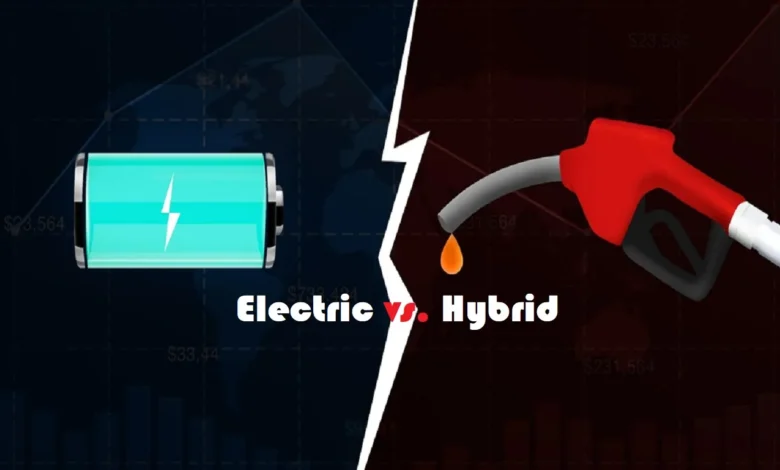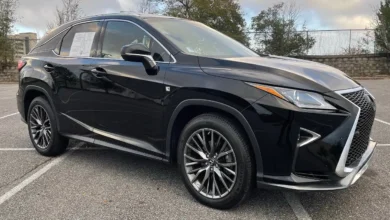
Deciding between an electric car and a hybrid can be challenging. Maybe you’re drawn to the eco-friendly reputation of electric vehicles but worry about range and charging. Or perhaps hybrids seem like a good middle ground, yet you’re unsure if they offer enough fuel savings. This article will break down both options to help you choose the car that truly suits your needs. Whether you’re a commuter, a long-distance traveler, or an eco-conscious driver, we’ll examine the pros and cons of each to find your perfect match.
Overview: Electric vs. Hybrid Cars
Electric and hybrid cars represent two of the most advanced, eco-friendly technologies in the automotive world. Understanding the basics of each can help narrow down which type best fits your lifestyle.
Electric Cars (EVs)
Electric vehicles run entirely on electric power. They have rechargeable batteries that power electric motors, allowing for a quiet, emission-free driving experience. EVs are known for their efficiency and low maintenance needs, though they depend heavily on available charging infrastructure. Today’s EVs often have a range between 100 to 400 miles, with this improving as battery technology advances.
Hybrid Cars
Hybrids are powered by both a gasoline engine and an electric motor. They typically switch between or combine the two sources for optimal fuel efficiency. For short distances or low speeds, hybrids often run on electric power, switching to gasoline at higher speeds or when more power is needed. This dual system allows hybrids to travel longer distances without needing a charge, making them a flexible option for a variety of driving needs.
| Feature | Electric Vehicles (EV) | Hybrid Vehicles |
| Power Source | Fully electric, rechargeable battery | Combination of gas engine + battery |
| Emissions | Zero emissions | Partial emissions |
| Refueling/Fueling | Charging stations | Gas stations + charging capability |
| Range | Limited to battery charge | Extended with gasoline backup |
You might also like: How to Reduce Automotive Exhaust Emissions
Key Differences: Electric vs. Hybrid Cars
When comparing EVs and hybrids, several key differences stand out:
- Power Source: Electric vehicles rely on a rechargeable battery only, while hybrids use both an electric motor and a gasoline engine. This gives hybrids the advantage of using gas when electricity isn’t available.
- Range and Flexibility: EVs are limited to their battery’s charge, which means planning around charging stations is essential for longer trips. In contrast, hybrids can rely on gasoline if the battery depletes, extending their range and making them ideal for long-distance travel.
- Charging and Fueling: Charging an EV can take anywhere from 30 minutes at a fast-charging station to several hours at home, depending on the model and setup. Hybrids, meanwhile, don’t require charging infrastructure as they can refuel at any gas station.
Pros and Cons of Electric Cars
Electric vehicles offer a unique set of advantages, but they’re not without some drawbacks. Here’s a closer look at the pros and cons of EVs:
Pros of Electric Cars:
- Zero Emissions: Electric cars have no tailpipe emissions, making them an environmentally friendly choice. They’re ideal for drivers focused on reducing their carbon footprint.
- Quiet, Smooth Operation: With fewer moving parts and no engine noise, EVs offer an exceptionally smooth and quiet ride.
- Lower Operating Costs: Electric cars typically cost less per mile to operate than gas-powered cars. The savings on fuel costs can be substantial over time, especially with rising gas prices.
- Incentives and Tax Credits: Many regions offer tax breaks, rebates, and other incentives to encourage the purchase of electric vehicles, helping to offset the upfront cost.
Cons of Electric Cars:
- Limited Range: While range is improving, most EVs still have a limit of 100-400 miles per charge, which can be inconvenient for long-distance drivers.
- Charging Infrastructure: Access to reliable charging stations can be limited, particularly in rural or suburban areas. This can make road trips or longer journeys more challenging.
- Higher Upfront Cost: Despite incentives, EVs often come with a higher initial price tag due to advanced battery technology.
| Pros of Electric Cars | Cons of Electric Cars |
| Zero emissions | Limited range |
| Quiet, smooth ride | Charging infrastructure is limited |
| Lower operating costs | Higher initial cost |
| Incentives and tax credits |
Pros and Cons of Hybrid Cars
Hybrids offer a practical combination of electric and gasoline power, providing some unique benefits and limitations.
Pros of Hybrid Cars:
- Extended Range: With the combination of gas and electric power, hybrids offer flexibility for both city driving and longer trips, making them ideal for varied driving needs.
- Reduced Emissions: Although hybrids aren’t emission-free, they produce significantly less pollution than traditional gas-only cars, especially during city driving.
- Fuel Efficiency in Stop-and-Go Traffic: Hybrids shine in stop-and-go traffic by relying on electric power for short distances, cutting down on fuel consumption.
- No Need for Charging: Hybrids don’t require an external power source, making them convenient for drivers without access to charging stations.
Cons of Hybrid Cars:
- Higher Maintenance Costs: The dual powertrain means hybrids can require more maintenance over time, especially for components like the gas engine and electric motor.
- Partial Emissions: While they are more eco-friendly than gas-only cars, hybrids still rely on gasoline, producing emissions and contributing to pollution.
- Additional Weight: The combination of battery, motor, and gasoline engine makes hybrids heavier than most EVs, which can affect handling and performance slightly.
| Pros of Hybrid Cars | Cons of Hybrid Cars |
| Extended range | Potentially higher maintenance costs |
| No need for charging | Still emits some pollutants |
| Lower fuel consumption in traffic | Additional weight |
Best Choice for Commuters
For commuters, the decision between an EV and a hybrid can depend on factors like daily mileage and access to charging stations:
- Electric Cars: EVs work well for short, predictable commutes. Charging at home overnight is often enough for day-to-day driving, making EVs a great choice for eco-conscious drivers who don’t travel far.
- Hybrids: For commuters who have longer or unpredictable routes, hybrids offer a balance of electric efficiency and gas-powered range. Hybrids are ideal for drivers who may not have regular access to charging stations but want to reduce their fuel consumption and emissions.
You might also like: Car Warning Symbols
Maintenance Costs and Considerations
Maintenance for EVs and hybrids varies greatly due to the different power sources. Here’s what you should consider:
- Electric Vehicles: EVs require fewer oil changes and have fewer moving parts, which translates to lower long-term maintenance costs. Brake systems also last longer due to regenerative braking.
- Hybrids: Hybrids, while more efficient than traditional gas-powered cars, require maintenance for both their electric and gas systems. Oil changes, engine upkeep, and battery replacements are standard, adding to maintenance frequency.
| Maintenance Task | Electric Vehicle (EV) | Hybrid Vehicle |
| Oil Changes | Not required | Required (for the engine) |
| Brake Maintenance | Less frequent due to regen braking | Moderate frequency |
| Battery Replacement | Expensive but long-lasting | Moderate frequency |
| Check-ups | Less frequent overall | Moderate frequency |
Environmental Impact
Electric and hybrid vehicles both contribute to lowering emissions, but each has a different environmental profile:
- Electric Cars: EVs produce zero tailpipe emissions, meaning they release no pollutants during operation. However, their batteries require energy-intensive production processes.
- Hybrid Cars: Hybrids have lower emissions than traditional gas cars, but they still release pollutants due to their gasoline usage. This makes them less eco-friendly than EVs.
Conclusion
Choosing between an electric and hybrid car boils down to your driving habits, access to charging, and environmental goals. Electric vehicles are best for those focused on sustainability and short, routine commutes. Hybrids, with their extended range, fit better for drivers who need flexibility and don’t have regular charging access.
We hope you found this article helpful. If you did, check out our blog for more great content like this.
Voting Section
Electric or Hybrid – What’s Your Pick?
Which type of car do you think best suits your driving style?





